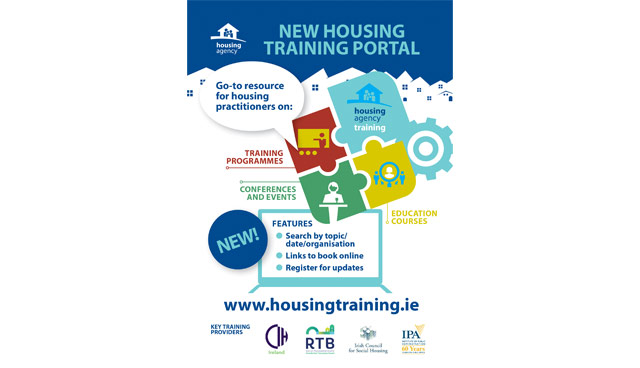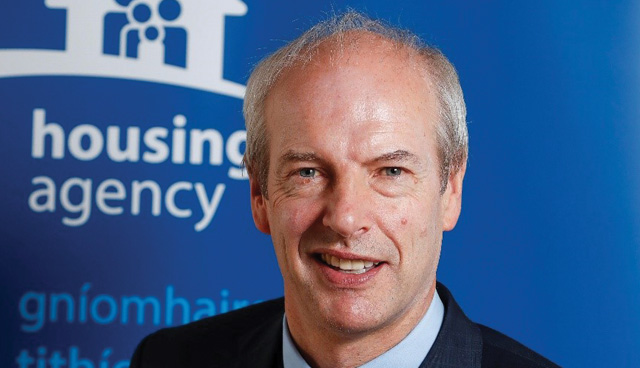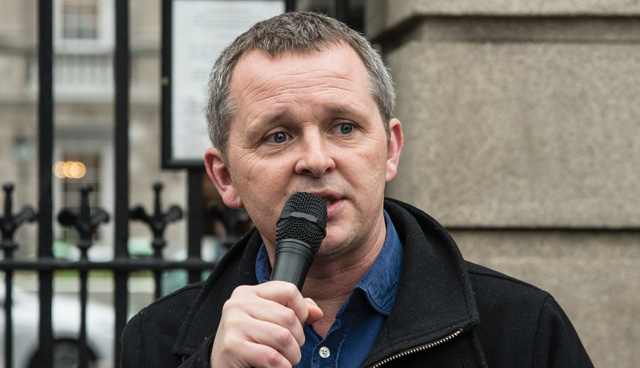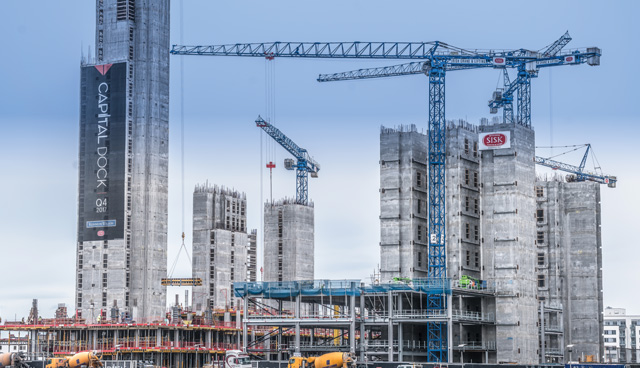
Training the Housing Professional
1st August 2018
Cover story: The foundations of a sustainable rental sector
1st August 2018Rebuilding Ireland: Where are we now?

Housing Minister Eoghan Murphy, TD, has been forced to defend the Government’s housing record after new data reveals a serious level of inflation in new build figures over recent years.
The Central Statistics Office (CSO) was asked to conduct research into how many homes were being built annually in Ireland after it was proven that the decades-old method of measuring housing completions through ESB connections was skewing the accuracy of figures.
The main problem identified with the method, and the reason the Department of Housing stopped officially using the method last year, was that ESB connections were being counted for buildings that weren’t new homes, such as unfinished housing developments, reconnections and non-dwellings.
DIT housing lecturer Lorcan Sirr, a long-standing critic of the ESB connections measurement, pointed out that the official figures of 85,000 houses built between 2011 to 2017, compared to the new CSO figures, which estimate 53,500 houses, call into question government targets and figures.
The CSO Report on New Dwelling Completions outlines that 18,000 new homes were made available for use in 2017. Just over 2,500 were vacant homes brought back in to use, roughly 1,000 were unfinished homes that had been lying in abeyance and 14,500 were newly built homes occupied for the first time.
While the Government’s figures have been criticised, the new data does show that the number of new homes becoming available for the first time was 75 per cent greater at the end of 2017 than at the end of 2015, with more than 5,000 vacant homes also brought back in to use in that time.
Meanwhile, the 2017 Summary of Social Housing Assessments (SSHA) shows that 85,799 households were assessed as being qualified for and in need of social housing support as of 28 June 2017. This represents a decrease of 5,801 households or 6.3 per cent on the last assessment, made in September 2016.
Key findings of the preliminary assessment include:
- 25 of 31 local authorities saw the number of households waiting for social housing fall;
- single person households make up almost 45 per cent of all households on the list;
- almost 42 per cent of all households on the list live in Dublin;
- being in need of rent supplement is the most commonly cited basis of need for social housing support (41 per cent);
- the majority (57.5 per cent) of those qualified for social housing support are unemployed;
- the median waiting time for a household on the list now stands at just over four years; and
- almost 15 per cent of households on the waiting list have specific accommodation requirements.
The SSHA will be used as the appropriate and objective basis to set targets for social housing delivery under Rebuilding Ireland. The overall target of delivering 50,000 social housing units by 2021 remains in place. ‘Rapid Build’ housing remains a key tenet of government policy, within the overall context of Rebuilding Ireland.
At the end of 2017, 208 Rapid Delivery homes had been completed across the Greater Dublin Area. An additional 24 rapid build projects, involving over 650 new homes, are now being advanced, 283 of which are scheduled for delivery in 2018.
These figures cast serious doubt on the Government’s capacity to provide 50,000 social housing units by 2021, including 30,000 new build homes.
Dublin City Council is also developing a volumetric rapid delivery programme of apartment developments. This could yield in excess of 700 homes. The Department of Housing is working closely with the Council to prioritise some of the larger apartment schemes, given the current demand.
Local authorities have been advised that rapid build approaches should increasingly become the norm in terms of delivering social housing projects.
Junior Housing Minister Damien English, TD, has confirmed that the Office of Government Procurement (OGP) put in place a framework of rapid delivery contractors in 2017, adding: “This framework is available for all local authorities and approved housing bodies to use in the interest of accelerated delivery.
“In this regard, my Department has organised information seminars for local authorities, as well as visits to rapid delivery projects under construction local authorities and approved housing bodies have also been asked to consider schemes which are suitable for early commencement, particularly in terms of their approved planning status.”
According to English, many of the issues around delivery, which standard social housing construction projects face, are also faced by rapid build projects, such as preparing sites, services/access to the site, community consultation, and planning.
He says: “There are, however, savings in terms of design and construction and these advantages are growing as more use is made of the OGP framework contract, and contractors gain more experience in implementing these projects.
“Under this mechanism, acceleration is delivered both by the use of the design and build services of these contractors and reduced construction time periods due to considerable off-site fabrication.”
Meanwhile, figures revealed by Fianna Fáil’s Barry Cowen, TD show that the state is 6,000 homes behind its Rebuilding Ireland social housing targets. The figures are drawn from parliamentary questions.
Cowen says: “These figures cast serious doubt on the Government’s capacity to provide 50,000 social housing units by 2021, including 30,000 new build homes.
“Rebuilding Ireland is around 6,000 units behind schedule when compared with the Minister’s own targets for direct build, acquisitions and repair and lease. This excludes missed opportunities like the 4,500 NAMA units that were turned down by local authorities. In order to make up this deficit and reach the overall targets we will need a major shift in government thinking to address the homelessness crisis and the 100,000 households on the waiting list.
“The Local Authority and Approved Housing Bodies approach is clearly not delivering. We need a renewed emphasis on the implementation of a direct building programme, which the State has successfully delivered in the past. Building 10,000 units per annum is achievable. Fianna Fáil delivered more than this number between 2007-2009.”
For its part, Sinn Féin has highlighted the fact that that out of the 1,500 Rebuilding Ireland Homeloan applications received, only 458 or 30 per cent were recommended for approval by the end of May 2018.
Sinn Féin Housing spokesperson Eoin Ó Broin, TD says: “The figures received from the Department of Housing indicate a very low level of approvals for the Rebuilding Ireland Homeloan that was launched in February this year.
“Over four months to May, 1,499 applications were received. The bulk of these applications were from areas of high housing pressure in Dublin and around the commuter belt. In total there were 619 applications from Dublin, with 540 applications from Cork, Galway, Kildare, Louth, Meath and Wicklow and 340 applications were received from other counties.
“Coupled with the low level of approval, is the fact that the average loan amount for the 458 applications recommended for approval by the end of May was only €189,133. With house prices continuing to rise in the key demand areas of Dublin and the commuter belt, this amount is not sufficient for most potential home buyers.”
He adds: “The Department figures show that the home loan scheme is off to an inauspicious start. At the time Sinn Féin said the focus should be on making the homes more affordable as opposed to providing more credit for the unsustainable market prices.
“An affordable housing purchase scheme for households earning between €40,000 and €75,000 with homes priced at between €170,000 and €260,000 is what is needed and is what can be done if you look at the success of the Ó Cualann model in Ballymun. Households cannot wait much longer for this government to act and to introduce an affordable housing scheme that works.”
According to Labour Party housing spokesperson Jan O’Sullivan, TD, there is no national affordable housing scheme. She says: “There are 700 publicly owned sites around the country, most of them owned by local authorities.
“Unless there is a national affordable housing scheme and councils can get going quickly on delivering social and affordable housing, the private operators will step in. The councils will engage them because they want to get some type of development going on the sites. Those operators will make a profit and the houses will be unaffordable for people. That cannot be allowed or accepted.
“These 700 publicly owned sites are the family silver. Private developers should have to fund whatever they do with their privately-owned sites, but they should not be able to jump in on the publicly owned sites when we so desperately and urgently need affordable housing, whether it is for rent or for purchase. We need a far greater sense of urgency. We must get rid of the blockages.
“If that means just one stage of approval for local authority houses, so be it. Give the authorities the money and tell them to build, but monitor it and have targets, including time targets. If they do not spend the money it should be given to others to spend. The situation simply cannot continue as it is.”






